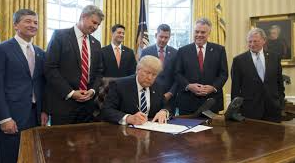For nearly 60 years, Executive Order 11246 has protected millions from workplace discrimination. But now, in just a matter of days, President Trump has erased decades of civil rights progress with the stroke of a pen Executive Order 11246 policies established in 1965. That requires federal contractors to take steps to ensure equal employment opportunities regardless of race, color, religion, sex, or national origin.
Supporters argue that this executive order aligns with Trump’s ‘Unleashing American Energy’ plan by streamlining the federal contracting process and reducing costs for agencies such as the Department of Agriculture, the Department of Commerce, and the Department of Defens. The goal of this objective of eliminating regulatory job requirement undermines decades of progress in civil rights protections and could pave the way for increased discrimination in federal contracting. Some argue that it can lead to a more efficient procurement system, potentially benefiting taxpayers.
In addition to getting rid of long standing affirmative action, the executive order mandates the elimination of diversity, equity, and inclusion (DEI) programs across all levels of the federal government. Meaning that if you are a non white, person, member of lgbtq, disabled , or of low income\ homeless you will no longer receive government help necessary for your survival. Administration acknowledges that these initiatives violate anti-discrimination laws by favoring certain groups over others in job settings for hiring and promotion. At the time this is written federal DEI staff were placed on administrative leave, effectively halting efforts aimed at promoting workplace diversity.
The effects of these actions are extreme .Proponents of the executive order argue that DEI programs unfairly prioritize identity over qualifications, creating an uneven playing field. They claim that a purely merit-based system would ensure that the most skilled individuals are hired and promoted, regardless of background. Advocacy groups have fought for years to be heard and seen, warning that these policies affect marginalized communities like ours extremely and hinder creation of inclusive work environments.
As the nation grapples with the changes being made Legal experts warn that the revocation of DEI programs may lead to lawsuits from civil rights organizations, arguing that the order violates existing anti-discrimination laws. If upheld, this policy shift could set a precedent for dismantling diversity initiatives across state and private sectors as well. which begins to raise questions about the balance between efficiency and equity in public services .
As these changes take effect, it’s more important than ever for communities to stay informed and take action. Whether it’s attending public forums, reaching out to representatives, or supporting advocacy groups, every effort counts in preserving workplace equality

